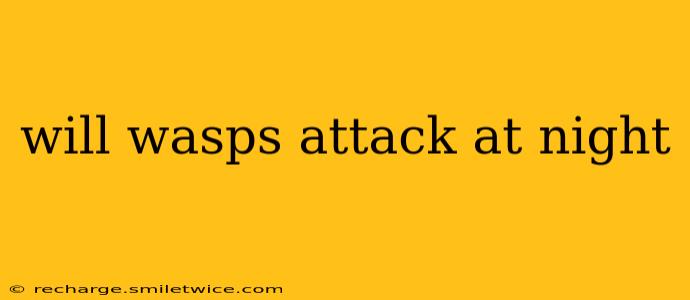Will Wasps Attack at Night? Understanding Nocturnal Wasp Behavior
The simple answer is: yes, some wasps can and will attack at night, though it's less common than daytime attacks. The likelihood of a nighttime wasp encounter depends on several factors, including the species of wasp, the weather, and the presence of light sources. Let's delve deeper into the nuances of nocturnal wasp behavior.
What Types of Wasps Are Most Active at Night?
Most wasp species are diurnal, meaning they're active during the day. However, some, like certain species of yellow jackets and paper wasps, remain active during twilight hours and may even venture out at night under specific circumstances. These nocturnal forays are often triggered by factors such as:
- Light sources: Artificial lights, particularly bright ones, can attract nocturnal insects, which, in turn, attract wasps hunting for food.
- Warm temperatures: Unusually warm nighttime temperatures can extend their foraging period.
- Nest defense: If their nest is disturbed at night, wasps will certainly defend it aggressively.
Why Do Wasps Attack? Self-Defense is Key
The primary reason wasps attack is self-defense. They aren't inherently aggressive, but they will sting if they feel threatened. This threat perception can be triggered by a variety of factors, including:
- Sudden movements: Jerky movements or swatting near a wasp can easily be perceived as an attack.
- Vibrations: Loud noises or vibrations near their nest can also trigger defensive behavior.
- Scent: Some perfumes or colognes might irritate wasps.
- Invading their space: Getting too close to a wasp nest, regardless of the time of day, is a surefire way to provoke an attack.
How to Avoid Wasp Encounters at Night
While nighttime wasp attacks are less frequent, precautions are still important:
- Turn off outdoor lights: Reducing light sources around your property can minimize the attraction of nocturnal insects and, consequently, wasps.
- Secure food and drinks: Keep food and drinks covered, especially outdoors, to avoid attracting wasps.
- Inspect your surroundings: Before spending time outdoors at night, take a moment to check for any visible nests.
- Avoid swatting: If you encounter a wasp, remain calm and move slowly away. Avoid swatting or making sudden movements.
- Wear light-colored clothing: Dark colors can attract wasps.
Are Nighttime Wasp Stings More Dangerous?
There's no evidence suggesting that nighttime wasp stings are inherently more dangerous than daytime stings. The severity of a sting depends on factors like the individual's allergic reaction, the type of wasp, and the amount of venom injected.
What should I do if I'm stung by a wasp at night?
The same first aid applies whether stung during the day or night:
- Remove the stinger (if present): Gently scrape it away with a credit card or your fingernail. Avoid squeezing it, as this can release more venom.
- Clean the area: Wash the sting with soap and water.
- Apply a cold compress: This can help reduce swelling and pain.
- Monitor for allergic reactions: Watch for symptoms like difficulty breathing, swelling of the face or throat, dizziness, or hives. Seek immediate medical attention if any of these occur.
Understanding wasp behavior, whether nocturnal or diurnal, helps minimize the risk of stings. By taking preventative measures and knowing how to respond to encounters, you can enjoy outdoor spaces safely, even at night.
